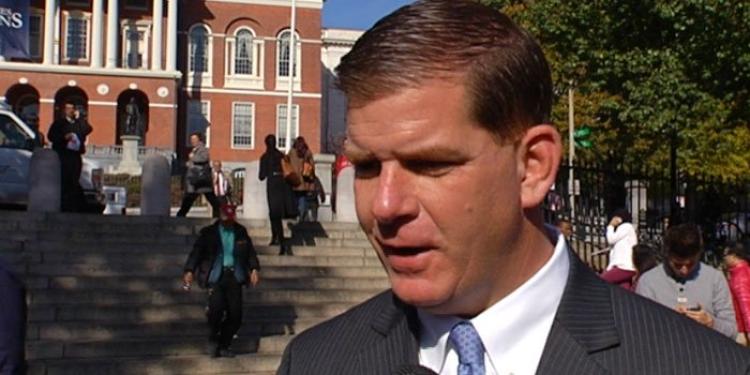Boston Tries to Halt Casino Project with Lawsuit
Posted: January 7, 2015
Updated: October 6, 2017

Boston Mayor sues Massachusetts State gambling commission over vote for Wynn Resorts to have better chance at generating more lucrative deals.
The Massachusetts State gambling commission was issued a lawsuit by Boston’s Mayor Martin Walsh and his administration on Monday in order to disrupt Wynn Resorts casino project in Everett. The suit requests that Wynn’s proposal be voided under the argument that Boston’s right to vote on the development was denied.
The Walsh administration tried to bring more light into the details of the nature behind the acquisition of the 33-acre chemical plant in Everett. After the proposals, in U.S. gambling news had surfaced of the possible involvement of Charles Lightbody, a known felon, in the property purchase. The suit has used this fact to make a case for the legal validity of Wynn’s license.
Mayor Walsh Displays Harsh Criticism of Gaming Board
Mayor Walsh has been a long-time critic of the gambling board who approved Wynn’s proposal. The mayor has repeatedly giving scathing comments and included much rhetoric in the 75-page lawsuit in Suffolk County Superior Court. He also stated the board’s holding of a mock hearing for the approval of the proposal demonstrated the board’s lack of concern for Boston’s input.
A larger part of the suit involves the questionable land deal by which Steve Wynn acquired his purchase of the land where he plans to build his $1.8 billion casino. The suit repeats the charges that the landowners hid the fact that a felon was one of the partners. Mayor Walsh declared that “to protect the people of Boston and to ensure the safety of our neighborhoods it is clear to us that this is the best and only way to move forward- for the Charlestown, for the city of Boston and for the entire Commonwealth.”
• Boston Mayor Martin Walsh sues the gambling commission to halt Wynn casino project.
• Mayor Walsh felt the decision to grant Wynn Resorts a license undermines Boston’s influence.
• Though not as lucrative to Boston, the Wynn proposal promises more financial growth overall.
• The gambling commission made a fair and thorough decision to back Wynn resorts.
Although Charles Lightbody was brought in for charges in October, his possible involvement has put the two registered landowners under federal and state prosecution. The landowners knew that Lightbody’s association with a convicted felon and a reputed associate of the New England Family of La Cosa Nostra could sink the purchase and kept Lightbody’s name from the deal. As a result his name wasn’t listed as one of the buyers on Wynn’s original proposal in 2012.
When word got out of Lightbody’s possible involvement, Wynn reduced the purchase price for the property by $40 million to reduce the amount of money any undisclosed shareholders could get. According to U.S. gambling laws, the Gaming Act prohibits a casino application from moving forward if a convicted felon has financial interest in the land a casino is to be built upon. The gambling board concluded that since the buyers were neither gaming nor non-gaming vendors, they are not subject to the “vendor licensing agreement” for which the felon requirement directly applies.
Gaming Board Steadfast in Decision
The Gaming Board has conducted itself well under fire. Spokeswoman for the 5-person committee Elaine Driscoll said the panel addressed Mayor Walsh’s complaints about the licensing “multiple times in a public and transparent manner.” A supporter for the project and campaigner accused Mayor Walsh of being a “poor sport” and that “people are getting tired of it. We’ve done everything by the book.”
“The commission believes that we have reviewed these issues thoroughly, objectively, and fairly, and that exhaustive review helped lead to the decision to award the Wynn license with appropriate conditions,” said Driscoll. The gaming board selected Wynn for the license because their project possessed a more secure financing plan, needed greater investment capital in the building structure which would create more overall jobs.
Lawsuit Could Bring More Opportunities for Revenue
Despite the concerns mentioned in Wynn’s suit, the underlying factor seems to be creating more revenue for the city. The chief competitor of Wynn Resorts in the acquisition of a license was The Mohegan Sun Project in Revere. Boston’s mayor reached out to both parties to strike some sort of concession. While a deal wasn’t brokered with Wynn resorts, the target of his angst, he was successful with the project in Revere.
The approval of The Mohegan Sun Project would bring $18 million to Boston. Though the gaming board ordered certain conditions that would bring some money such as mitigation payments from Wynn Resorts, they cannot compare to the revenue that would come from the Revere Project. Revere and Somerville, who may have gain financially as well, also sued the gambling board.
It also came into question of whether or not Boston should be recognized as a host community to this proposal. If Boston were recognized, then neighboring cities could have some right to vote on whether Wynn resorts would get the license. Also, Boston could make their own deals with gambling companies. These could also include opportunities for online and mobile betting.
In the lawsuit, Mayor Walsh’s argument for making Boston a host community focused primarily on it’s location to the casino. “With Boston providing the sole access point to the casino site, the vast majority of patrons would be required to drive through Rutherford Avenue and Sullivan Square in Charlestown- an area that already faces severe traffic congestion. Wynn has stated if he were to win the license he would build an access road leading to the casino that would bypass the city. This plan has yet to carried out.












